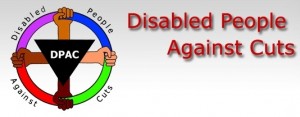
11th August 2016
Disabled activists are to hold a week of action to coincide with the start of the Rio 2016 Paralympics, in a bid to highlight the impact of austerity-driven cuts on disability rights.
Disabled People Against Cuts (DPAC) hopes to use the publicity generated by the Rio Paralympics to draw attention to the “disproportionate impact of austerity” on disabled people.
DPAC plans to use the public interest generated by the games in the same way it did four years ago, when five days of protests focused on the hypocrisy of IT giant Atos sponsoring London 2012 at a time when it was causing “harm and suffering” to disabled people through its contract to assess claimants of out-of-work disability benefits.
Ellen Clifford, a member of DPAC’s steering group, said that next month’s week of action would “draw attention to the cumulative impact of the cuts on disabled people that are taking disabled people’s rights back decades with attacks in every area of our lives from education to independent living to employment to income”.
She pointed out that the UK has become the first country to be investigated for grave and systematic violations of the UN Convention on the Rights of Persons with Disabilities because of the cuts and “the ideological attacks waged by the Tory government”.
Clifford said: “Whilst we will not be protesting the games themselves we will be using this opportunity to raise awareness of the increasing number of disabled people whose access not only to sport and recreation but also to basic human rights to eat, drink and use the toilet are being taken away as a result of the cuts.”
Linda Burnip, a DPAC co-founder, said the Rights Not Games week of action was not intended to oppose the games or criticise British Paralympians, but to highlight the contrast in funding for the Paralympics with the cuts in disabled people’s support in the UK.
Atos will play a major role in next month’s Paralympic Games, just as it did in London, as the “worldwide information technology partner” for both the Olympic and Paralympic Games in Rio.
Although Atos eventually pulled out of the contract to carry out work capability assessments, as a result of a sustained campaign from DPAC and other disabled activists, it now carries out assessments for personal independence payment, another source of huge concern for campaigners.
Burnip said the continuing sponsorship of the Paralympics by Atos was “offensive”, and added: “We want to compare the costs of the Paralympics to the amount that disabled people have to live on.
“Once every four years, disabled people, disabled athletes, become wonderful beings, inspirational, brave, all that sort of stuff, but in between times they are having their [Motability] cars taken off them because they don’t qualify for PIP anymore.
“It’s probably the only time that there is anything positive about disabled people. The rest of the time people are deemed to be scroungers and a burden.
“We want disabled people’s lives to be taken more notice of, and we want changes to legislation that will make that happen.”
DPAC’s week of action will include an exhibition of work by disabled artists; a lobby of parliament on Monday 5 September, the day MPs return from their summer recess, which will call for a legal right to independent living; and the launch of a report evaluating the impact of the closure of the Independent Living Fund, a year after it was shut down by the government.
A national day of action will take place on 6 September, with a protest in London the following day that will call for an end to deaths linked to flaws in the benefits system and draw attention to the failure of successive governments to make that system safe.
An online action will coincide with the Rio Paralympics opening ceremony from midnight UK time on Thursday 8 September.
The week will end with an international conference in north London on 10 September, with speakers attending from Greece and Canada, and others from Ireland and Germany taking part via Skype, on how to “collectivise our opposition to the impact of austerity on disabled people”.
